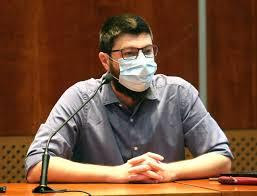Filenews 22 January 2021
February should be considered more of a transition period than a period of relaxation, the head of the Advisory Scientific Committee, Assistant Professor of Pathology at the European University and Pathologist specializing in Infection Control, Dr. Konstantinos Tsioutis, adding that we have an improvement in the community, with a decrease in the positivity rate, but the burden on the community remains high despite any improvement.
Asked about Monday's meeting with the President of the Republic, Nicos Anastasiades, Dr. Tsioutis said they would see the situation.
"We already have the National Report today the last one that shows us some data, but by Monday we will have additional data, which may also be supportive of what we are already seeing. We will see better until then the hospitalizations, because this is more the biggest parameter and the most important. So, we'll see how the hospitalizations evolve in the Intensive Care Units, which was the main parameter that brought us up to the tightening of the measures. And I am sure that suggestions will also be conveyed by both the Commission and the Commission, which is currently preparing the de-escalation plan and will perhaps be discussed on the basis of the data so far, which is the best way forward," he added.
When asked if he thinks Cyprus can relax from February 1st, Dr Tsioutis said that what we are seeing is that there is indeed a clear improvement in the community.
"This improvement was initiated by the cumulative result of the December measures. The outcome of the measures put forward on 10 January is yet to be assessed. That's a given, so you're going to start appreciating it, seeing it next week. Yes, we have an improvement in the community, with a decrease in the positivity rate, but the burden on the community remains high despite any improvement. We want to see it decrease even further because the relaxes will bring a flare-up and this flare-up should be controlled, detected in a timely manner and not put us in situations of the previous weeks," he noted.
But the other one, Dr. Tsioutis, is that the numbers of nurses, the number of admissions, the number of nurses in intensive care and the occupancy rate in the Intensive Care Units remain high.
"So it is still too early for us from an epidemiological point of view to give clearly that there is a positive image in Cyprus. But we as scientists and experts in the field will have to give some positions, explain these positions in detail, explain in detail the situation and give an assessment of where we can go from now on with the current data, but also the risks that exist from a sharp relaxation in the February period," he added.
As he said, 'our position as a Commission in general is that February should be seen as more of a transitional period than a period of relaxation'.
"A transition from a period of strict measures, slowly to a period of relaxation. At the same time, we should consider a great many parameters and the epidemiological situation, the increased tests and the tests targeted at workplaces, indoors, etc., any risk of opening specific sites and activities and of course a continuous monitoring of the situation which, in combination with the data from the tracing, we can intervene immediately in case we detect new outbreaks".
The picture shows - the National Report came out today - that according to the downward trend in the number of cases in the previous days, it has currently stabilized around 150 to 160, the member of the Advisory Scientific Committee, Professor of Microbiology/Moleculariology of the Medical School of the University of Nicosia Dr. Petros Karagiannis, told the CYPE.
"I hope that we will have a further fall as a result of these restrictive measures, not the previous ones. There is a drop in the number of hospital cases, but those who are critical are still at high levels, around 60. There were 184 cases yesterday and the trend per Province is downward and noticeable at the moment. We hope to continue like this, at least until 31 January. If there are any relaxes, we can be more sure they won't cause us any trouble,' he added.
Asked if we would see any relaxations from February 1st, Dr Karagiannis said that if by then both hospitalizations and the number of cases have reduced, "I think some relaxation is justified".
"What this relaxation will be - what areas it will affect, etc., has not yet been decided," he concluded.
Source: eyenews/KYPE
